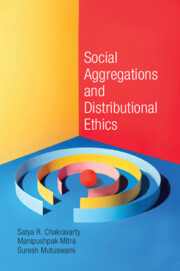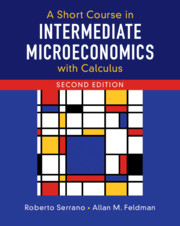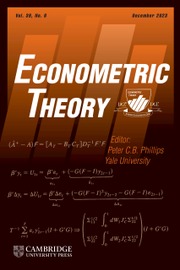Social Aggregations and Distributional Ethics
This book analyzes the following four distinct, although not dissimilar, areas of social choice theory and welfare economics: nonstrategic choice, Harsanyi's aggregation theorems, distributional ethics and strategic choice. While for aggregation of individual ranking of social states, whether the persons behave strategically or non-strategically, the decision making takes place under complete certainty; in the Harsanyi framework uncertainty has a significant role in the decision making process. Another ingenious characteristic of the book is the discussion of ethical approaches to evaluation of inequality arising from unequal distributions of achievements in the different dimensions of human well-being. Given its wide coverage, combined with newly added materials, end-chapter problems and bibliographical notes, the book will be helpful material for students and researchers interested in this frontline area research. Its lucid exposition, along with non-technical and graphical illustration of the concepts, use of numerical examples, makes the book a useful text.
- Review questions
- Numerical examples and non-technical explanations of concepts
- Graphical representations of concepts and results
Product details
July 2023Hardback
9781108832045
250 pages
237 × 159 × 21 mm
0.46kg
Available
Table of Contents
- Preface
- 1. Introduction
- Bibliography
- 2. Individual and social orderings
- 2.1. Introduction
- 2.2. relations
- 2.3. Preference relations and choice sets
- 2.4. Social orderings, quasi-orderings and weak quasi-orderings
- 2.5. Exercises
- 2.6. Bibliographical notes
- bibliography
- 3. May's theorem
- 3.1. Introduction
- 3.2. The framework
- 3.3. May's theorem
- 3.4. Robustness of the axioms
- 3.5. Exercises
- 3.6. Bibliographical notes
- Bibliography
- 4. Arrow's theorem with individual preferences
- 4.1. Introduction
- 4.2. The framework
- 4.3. The Arrow Impossibility theorem
- 4.4. Two proofs of Arrow's theorem
- 4.5. Exercises
- 4.6. Bibliographical notes
- Bibliography
- 5. Relaxing Arrow's axioms
- 5.1. Introduction
- 5.2. Relaxing Weak Pareto
- 5.3. Relaxing transitivity of (Social) binary relations
- 5.4. Domain restriction: single peaked preferences
- 5.5. Exercises
- 5.6. Bibliographical notes
- Bibliography
- 6. Arrow's theorem with utilities
- 6.1. Introduction
- 6.2. The framework and assumptions
- 6.3. Measurability and comparability
- 6.4. Arrow's theorem
- 6.5. Positional dictatorships
- 6.6. Leximin
- 6.7. Utilitarianism
- 6.8. Exercises
- 6.9. Bibliographical notes
- Bibliography
- 7. Harsanyi's Social Aggregation theorem
- 7.1. Introduction
- 7.2. The model
- 7.3. Appendix
- 7.4. Illustrative examples
- 7.5. Exercises
- 7.6. Bibliographical notes and discussions
- Bibliography
- 8. Distributional ethics I
- 8.1. Introduction
- 8.2. Basics and preliminaries
- 8.3. Common features
- 8.4. The direct approach
- 8.5. The inclusive-measure of well-being approach
- 8.6. Direct descriptive inequality indices and reduced form welfare functions
- 8.7. Measuring inequality within the Harsanyi framework
- 8.8. Comparability between achievement and shortfall inequality: an expository analysis
- 8.9. Equality of opportunity: an illustrative discussion
- 8.10. Inequality and welfare with an ordinal dimension of well-being
- 8.11. Inequality as an ordinal notion
- 8.12. Fairness in network resource allocation: an analytical exposition
- 8.13. Exercises
- 8.14. Bibliographical notes
- Bibliography
- 9. Distributional ethics II
- 9.1. Motivations
- 9.2. Basics and preliminaries
- 9.3. Common features
- 9.4. The direct approach
- 9.5. The inclusive-measure of well-being approach
- 9.6. Direct descriptive multidimensional inequality indices and reduced form welfare functions
- 9.7. Inequality under uncertainty: a brief discussion
- 9.8 Exercises
- 9.9 Bibliographical notes
- Bibliography
- 10. Social choice functions
- 10.1. Introduction
- 10.2. The framework and the Gibbard-Satterthwaite theorem
- 10.3. Two proofs of the Gibbard-Satterthwaite theorem
- 10.4. Single-peaked preferences
- 10.5. Exercises
- 10.6. Bibliographical notes
- Bibliography
- 11. Strategyproofness on quasi-linear domains
- 11.1. Introduction
- 11.2. The pure public goods problem
- 11.3. Allocation of a single indivisible object
- 11.4. Relaxing outcome efficiency: Affine maximizers
- 11.5. Exercises
- 11.6. Bibliographical notes
- Bibliography
- Index.




